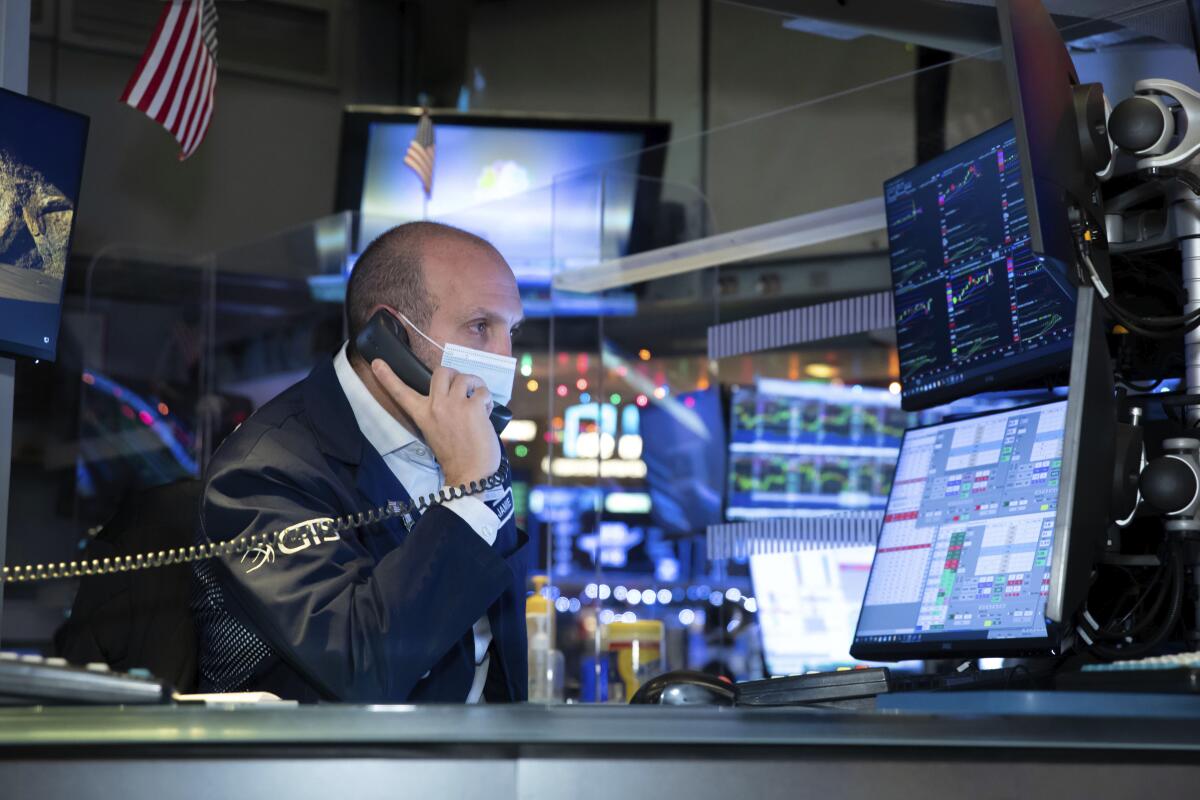Stocks’ late stumble leaves S&P 500 just short of a record high

- Share via
U.S. stock indexes closed mostly higher Thursday after a late stumble pulled the Standard & Poor’s 500 index just short of its third consecutive all-time high.
The benchmark index ended the day down 0.1%, though it’s still on track for its second weekly gain. Stocks on Wall Street are continuing to coast after their rocket ride last month powered by hopes for coming COVID-19 vaccines. The Nasdaq composite set a record high for the second straight day. Treasury yields mostly declined, a reversal from earlier in the week.
A couple of reports on the economy helped support stocks. One showed that growth in the U.S. services sector, including healthcare and retail, was slightly stronger last month than economists expected. A separate report said fewer U.S. workers filed for unemployment benefits last week than forecast, though economists cautioned that the number may have been distorted by the Thanksgiving holiday.
Investors have also been encouraged this week by signs that Democrats and Republicans in Washington may get past their bitter partisanship to reach a deal to provide more financial support for the economy. House Speaker Nancy Pelosi and Senate Majority Leader Mitch McConnell spoke with each other Thursday, the day after Pelosi signaled a willingness to make major concessions in search of a coronavirus rescue package. President-elect Joe Biden urged Congress on Wednesday to pass a relief bill now, with more aid to come next year.
“There’s a lot of optimism being built into the market right now,” said Sam Stovall, chief investment strategist at CFRA. “Investors are sort of keeping their fingers crossed that we come up with a stimulus package, no matter the size.”
The S&P 500 slipped 2.29 points to 3,666.72. The Dow Jones industrial average rose 85.73 points, or 0.3%, to 29,969.52. The Nasdaq composite advanced 27.82 points, or 0.2%, to 12,377.18. Small-company stocks made out better than the broader market. The Russell 2000 index climbed 10.67 points, or 0.6%, to 1,848.70.
Momentum across markets has slowed after the S&P 500 surged 10.8% last month on hopes that one or more coronavirus vaccines will get the global economy closer to normal next year. The burst of optimism boosted stocks of travel companies, banks and smaller businesses in particular — companies that have been among the most harshly punished during the pandemic.
“It’s pretty clear that investors are looking at some of those areas that would benefit from a more complete reopening,” said David Lefkowitz, head of Americas equities at UBS Global Wealth Management.
Now that stock indexes are back at all-time highs, worries about the still-raging pandemic are making further big gains more difficult. Governments around the world are considering the approval of several coronavirus vaccines, and a U.S. rollout could begin this month if regulators approve. Britain has already approved emergency use of a COVID-19 vaccine developed by Pfizer and BioNTech.
But vaccines would initially go out only to protect healthcare workers and others who are at high risk. In the meantime, coronavirus case counts and hospitalizations continue to surge. That has governments around the world bringing back varying degrees of restrictions on businesses and consumers worried about their own health. That, in turn, is threatening the economic recovery that got underway in the spring.
The Labor Department said 712,000 workers applied for jobless benefits nationwide last week. That’s an improvement from the 787,000 of the previous week, but it still towers over the roughly 225,000 weekly before the pandemic struck.
Concerns about the potential economic fallout from more restrictions on businesses has intensified the pressure on Washington to deliver more aid. Still, Democrats and Republicans have been arguing for months without much progress.
“Ideally we would get some kind of fiscal support sooner rather than later,” Lefkowitz said. “The big news is there’s more of a line of sight on the fact that the economy will likely get back to full strength.”
On Wednesday, Federal Reserve Chairman Jerome H. Powell and Treasury Secretary Steven T. Mnuchin underscored the importance of such relief during a House Financial Services Committee hearing. The economy has been struggling more since extra unemployment benefits and other stimulus approved earlier this year by Congress expired.
Ralph Lauren led the gainers in the S&P 500 on Thursday, vaulting 8.7%. Several travel-related companies also finished near the top of the leaderboard, clawing back more of their precipitous losses from earlier in the pandemic. American Airlines Group rose 8.3%, Norwegian Cruise Line gained 8.6%, and United Airlines climbed 6.8%. All three, though, remain down more than 40% for 2020.
Boeing surged 6% after Ireland’s Ryanair announced that it will order 75 more of the aircraft manufacturer’s 737 Max jets, a vote of confidence for the troubled Max from one of Europe’s biggest budget airlines. The plane was grounded in March 2019 after two crashes killed 346 people.
The yield on the 10-year Treasury slipped to 0.91% from 0.94%.
European stock markets closed mostly lower. Markets in Asia were mixed.
More to Read
Inside the business of entertainment
The Wide Shot brings you news, analysis and insights on everything from streaming wars to production — and what it all means for the future.
You may occasionally receive promotional content from the Los Angeles Times.










